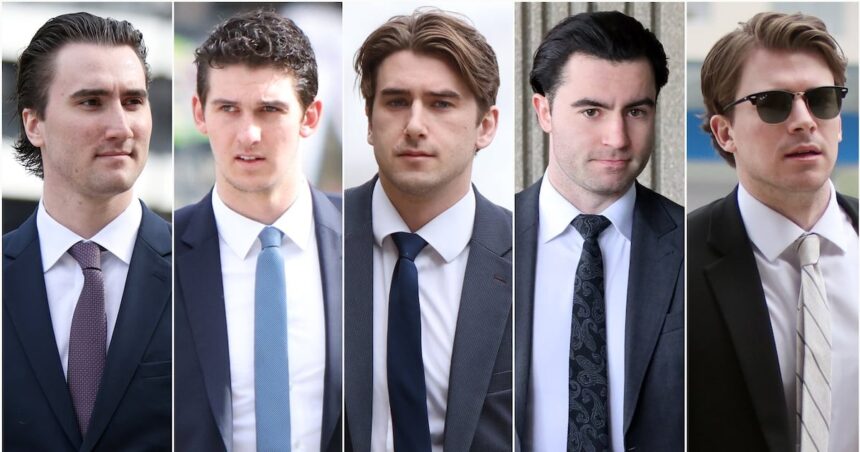The defence team for five former World Junior hockey players accused of sexual assault has concluded its case today in a London, Ontario courtroom, marking a significant moment in a trial that has captivated public attention across Canada.
The five players, who were members of the 2018 Canadian World Junior team, face serious allegations stemming from an incident at a London hotel following a Hockey Canada gala. The prosecution alleges the woman, whose identity remains protected by a publication ban, was sexually assaulted in a hotel room after meeting one of the players at a downtown bar.
In court today, the final defence witness offered testimony challenging the reliability of the complainant’s recollection of events. This follows a pattern established throughout the defence’s presentation, which has focused heavily on inconsistencies in the woman’s testimony and questions about consent.
“What we’re seeing here represents a profound examination of consent in the context of celebrity culture,” says Dr. Elaine Richardson, a Toronto-based legal analyst who has been following the proceedings. “The case brings into sharp focus questions about power dynamics that extend well beyond sports.”
The trial has sparked intense conversation across Toronto and nationwide about accountability in professional sports. Local sports bars report that conversations often shift to the case’s implications when hockey games are televised.
“You can feel the tension when it comes up,” says Marco Delgado, owner of The Blue Line sports bar in Toronto’s west end. “Our regular customers are divided – some defending the players, others expressing concern about hockey culture. It’s become more than just a legal case.”
Legal experts suggest the prosecution faces significant challenges in establishing guilt beyond reasonable doubt, particularly given the defence’s strategy of highlighting memory gaps and alleged inconsistencies in the complainant’s account.
The complainant testified earlier in the trial that she met one of the players at a bar and went willingly to his hotel room, where she engaged in consensual sexual activity. However, she alleges that additional players then entered the room, at which point the encounter became non-consensual.
Defence attorneys have presented evidence questioning this timeline, including text messages and security footage they claim contradicts key elements of her testimony.
The case has also spotlighted Hockey Canada’s handling of sexual misconduct allegations. Following public revelation of the case, the organization faced intense scrutiny for its use of a special fund partly maintained through minor hockey registration fees to settle sexual assault claims.
“This case represents a watershed moment for sports governance in Canada,” notes sports management professor Dr. Jordan Sinclair of Ryerson University. “Regardless of the verdict, the institutional response to these allegations has already transformed how sports organizations approach these issues.”
In Toronto’s hockey community, youth coaches report having difficult but necessary conversations with players about consent and responsible behavior.
“We’re using this as a teaching moment,” explains Samantha Chen, who coaches bantam-level hockey in North York. “These are hard conversations, but better to have them now than after something happens.”
The trial is expected to move to closing arguments next week, with a verdict anticipated before month’s end. Legal observers note the case’s complexity and sensitivity may require extended deliberation from the jury.
Meanwhile, Hockey Canada has implemented significant governance changes, including mandatory sexual consent training for all national team members and enhanced reporting mechanisms for misconduct allegations.
As Toronto awaits the verdict, the case continues to spark crucial conversations about consent, accountability, and the responsibilities that come with public prominence – discussions that may prove to be the most enduring legacy of this high-profile trial.







